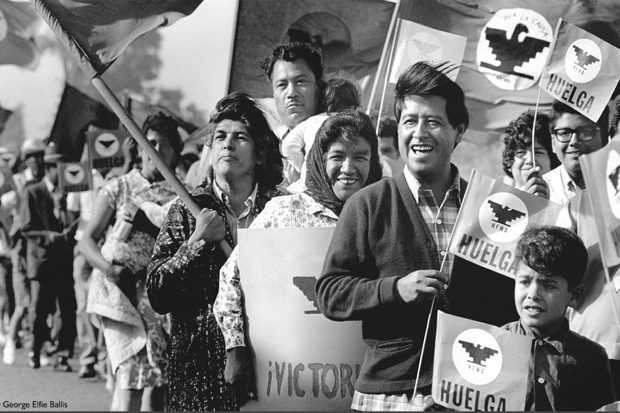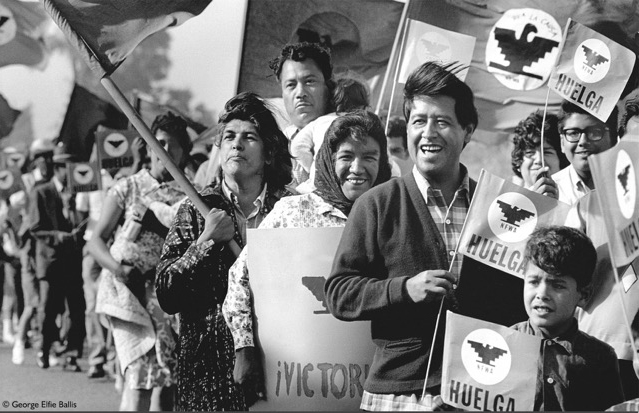
For nearly 60 years, farmworkers around the country have celebrated the legacy and momentous actions of Cesar Chavez.
In 1965, Chavez began his first steps toward changing the lives of farmworkers. That year, he was asked by Filipino farmworkers to support their strike demanding a pay raise. The Filipinos were mostly involved in the Agricultural Workers Organizing Committee (AWOC), led by Larry Itliong, whereas Mexican-American and Mexican farmworkers had formed the National Farm Workers of America (NFWA), led by Chavez and Dolores Huerta.
One year later, those organizations combined as the United Farm Workers (UFW). The UFW and its case for better working conditions in the fields got support from across the nation following their 340-mile march from Delano to Sacramento—from March 17 to April 10, 1966.
At that time, most farmworkers were earning a mere 40 cents an hour and did not qualify for unemployment insurance. The hardworking individuals who put food on America’s tables were unable to do so for their families.
This year, on March 30, the Pan Valley Institute (PVI) of the American Friends Service Committee held an event at the Unitarian Universalist Church of Fresno in celebration of Cesar Chavez Day. The event was part of PVI’s Artevism Project. Lea Ybarra, Ph.D., recently retired from Johns Hopkins University and a Fresno State alumna, hosted the event. She reiterated the importance of Chavez’s achievements and what they mean for many Latinx families.

For decades, the Latino community has been emotionally and physically brutalized in exchange for wanting a better life for their families. “There has always been a struggle for rights in this country,” says Ybarra. “For instance, in the 1800s, you have people like Tiburcio Vasquez and Joaquin Murrieta, who were called ‘bandits,’ but they fought for the rights of Mexicanos.
“We know about the lynching of African Americans, mainly in the South, but also hundreds and hundreds of Mexicans and Native Americans had experienced the same fate.”
Ybarra pointed out that the struggle in the fields for better working and living conditions started earlier than the 1960s. There was a strong movement in the 1930s in the cotton fields around Delano when hundreds of farmworkers went on strike.
Mendez v. Westminster was one of the first major court cases to address this discrimination.
Gonzalo Mendez was told that his daughter would be placed in a remedial school simply because the Westminster school assumed that she did not speak English; in fact, his daughter was born here and spoke English well. When the case made its way to the Supreme Court, Mendez’s victory opened the gate for many schools in western California to be desegregated.
Discrimination against Latinos occurred not just in a nutshell but also in major areas of history such as World War II, with soldiers of color coming back from war to face discrimination. Even dead soldiers were not buried in local cemeteries because the cemeteries were segregated.
There have long been fights for the rights of Latinos. The 1960s was a time filled with enraged minorities wanting to speak their minds and obtain their human rights. Dr. Martin Luther King Jr., the civil rights movement and the women’s rights movement were just a few of the groundbreaking stepping stones for future generations.
Ybarra was a student at Fresno State during the 340-mile march. She recalls how all the Chicano and agriculture students went to watch Chavez speak. The agriculture students brought boxes of grapes to the speech and ate them in front of him and began throwing grapes at the Chavez supporters.
Most Latino students supported Chavez’s cause. “Every worker deserves dignity. And every worker deserves decent wages and so forth,” says Ybarra. Like her, many of those students were the children of farmworkers.
That was a defining moment for her, along with the rest of the Chicano students, she admits. Chavez noticed the influence the university students could have and held a conference in Coachella specifically for students. Thousands of students showed up in support of their community’s struggles.
The protests by Mexican American students, farmworkers, soldiers and community members were the context of the Chicano movement, including protests against the Vietnam War. The 1960s was a period of many changes. “Think about Martin Luther King, the bus boycott, the women’s movement, Asians fighting for their rights, Chicanos in the west and Puerto Ricans in the east…All this happening at the same time,” said Ybarra.
She also mentioned the importance of the Vietnam War, which started in the mid-1950s and ended in the mid-1970s. “If you were in the Chicano movement, you were against the war. For those in college, they could get a deferment not to go to war, but poor people of color, as well as poor Whites, could not get such a deferment, so they fought not to be sent to Vietnam,” explained Ybarra.

Professor Ralph C. Guzman (1925–1985) of UC Santa Cruz states that Latinos were 9% of the population (in the mid-1960s) but 25% of the casualties in Vietnam, a war in which people of color were fighting against people of color.
The struggle continues today because if there are no established labor contracts in the fields, there are no rights for a worker’s protection. Ybarra says there is still much work to be done, for example, education. There are still too many Latino dropouts and not enough faculty representation.
The Latino community has made progress. There were almost no Mexican doctors or university professors 50 or so years ago.
Progress is something to be proud of, but never forget the sacrifices that needed to be made to achieve this level of Latinx representation.
As Chavez said, “We cannot seek achievement for ourselves and forget about progress and prosperity for our community. Our ambitions must be broad enough to include the aspirations and needs of others, for their sakes and for our own.”

